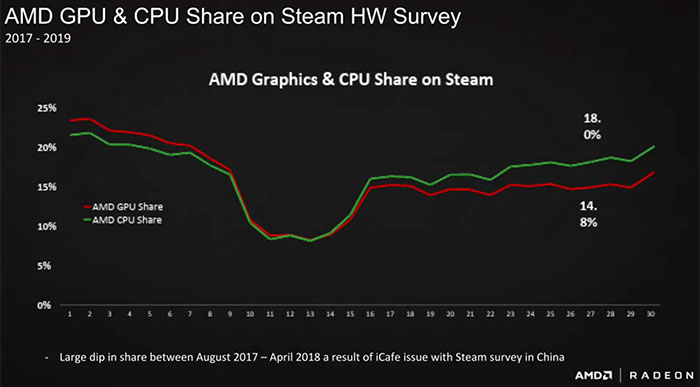HEXUS periodically checks in on the Steam Hardware Survey (SHS) to see if there are any significant trends being established or upset. As one of the biggest frequently updated sources of such data available, and especially relevant to PC gamers, the SHS is an invaluable resource. However, the SHS processor results and trends don't seem to tally well with AMD's reported successes after it entered its Zen age.
Consider the latest SHS processor data and you will see that AMD has suffered another small but nagging monthly decline. The June results are unfortunately pre- Ryzen 3000, but there have been some previous gen Ryzen bargains to be had in recent months, and people know the AMD chipset motherboards are good for inter-generational upgrades.

ExtremeTech reports that a recent interview with AMD's Scott Herkelman casts some light on issues with the AMD SHS processor stats. Apparently a bug was introduced to SHS processor brand counting in an August 2017 update. The bug, which still exists, over-counts Intel processors as "every single individual login at an iCafe [counts] as another instance of that computer’s system configuration".
An iCafe is an internet café and they are popular places for gamers to spend free time particularly in China. The Chinese iCafe market is so big that AiBs, for example, have previously custom designed graphics cards to address their particular spec requirements. Back to the point - these internet cafes predominantly spec Intel processors, and with the login = new computer misreporting this skews the figures heavily. The latest figures I found said that there are 146,000 internet cafes in China with 20 million daily users (2015).
AMD's Herkelman indicated that Valve knows of its CPU miscounting issue but isn't very concerned about it. "They did change their algorithm a little bit, but they really aren't motivated to go in and change this," Herkelman told Hot Hardware in a video interview, "because the purpose of their data is not for market share. The purpose of their data is to show general trends to game developers… it definitely doesn't track our real share…. you can see the same thing actually happen in our CPU share. It's still under-represented, it's the same exact curve, and it’s all related to iCafes".

Above you can see a graph that Herkelman presented as evidence of the iCafe effect. You will observe the big dip in the graph where Steam facilitated PUBG gaming in China, a little later the SHS counting algorithm was tweaked (but not fixed entirely, according to the AMD exec). Hopefully, Steam/Valve will continue to make its reporting more accurate, to make its data more useful and valid in general.













